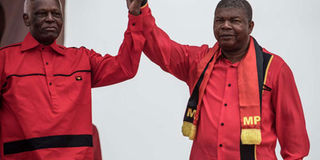Angola’s new era as Kenyan poll row ends in court

Angolan President and The People's Movement for the Liberation of Angola President Eduardo dos Santos (left) and MPLA candidate to the presidency Joao Lourenço hold hands during the closing campaign rally in Luanda, on August 19, 2017. Lourenço won. PHOTO | MARCO LONGARI | AFP
What you need to know:
- Wednesday’s election was the fourth since the country gained independence from Portugal in 1975.
- According to media reports, the president-elect is a party loyalist handpicked by Dos Santos as his successor.
By all indications, the Angolan General Election on August 23 and reportedly monitored by 240 national and 1,200 international observers, was conducted with near clockwork precision.
All along, there was little doubt that the ruling Popular Movement for the Liberation of Angola (MPLA) would carry the day, as it had done in the past.
Wednesday’s election was the fourth since the country gained independence from Portugal in 1975 and the third since the end of the civil war in 2002.
VOTE COUNT
The 9,317,294 voters were expected to choose a new president and his vice, as well as 220 MPs.
Impressively, and as a mark of the election’s smoothness, the provisional results were released by Thursday, though the final tally is not due until September 6.
According to the National Electoral Commission, the ruling party got 64.57 per cent of the ballots cast, even as the two main opposition parties cried foul.
The Union for the Total Independence of Angola (Unita) and the Convergence for Angolan Salvation-Electoral Coalition (Casa-Ce) were represented by Isaias Samakuva and Abel Chivukuvuku respectively.
As if on cue, they immediately said the vote count was flawed, despite the fact that Unita won a lowly 24.4 per cent of the votes and Casa-CE 8.56 per cent.
DOMINANCE
Flagbearers for lesser though vocal opposition parties included Lucas Ngonda of the National Front for the Liberation of Angola (FNLA).
Other opposition candidates were Quintino Moreira of the National Patriotic Alliance (APN) and Benedito Daniel of the Social Renovation Party (PRS).
When the chips were down, the less contending parties had garnered less than one per cent each.
Claims of flaws aside, the combined opposition entities were evidently no match for MPLA.
The situation in Angola was different from the one in Kenya, where a General Election was held on August 8.
NASA'S CLAIMS
The slew of positions up for takes included those of governors, senators, MPs and woman and ward representatives.
Whereas the winners in those categories were acknowledged with minimal drama, in true Kenyan fashion, the presidential race proved to be controversial.
Even before incumbent Uhuru Kenyatta was announced the winner on August 11, the opposition National Super Alliance had come out with claims of flaws.
Declaring the results to be computer generated later, the coalition finally decided to contest them in the Supreme Court.
OBSERVERS
In the meantime, there have been threats of civil disobedience as a means of protesting “electoral malpractices, past and present”, amid frightful calls for the secession of some regions.
As the electoral drama unfolds, a hapless Kenyan is watching helplessly as the Kenyatta and Odinga political dynasties feuds continue.
With an impressive turnout of 79.17 per cent, the election was lauded by observers as peaceful and orderly.
Evidently, the electorate had hoped for clean results and move on with their lives.
DOS SANTOS
Unfortunately, the fate of millions now rests with the court, amid an ethnic narrative for years exploited by politicians fighting for supremacy.
In Angola, João Lourenço, the MPLA candidate, was all set to become the country’s next president and successor to retiring José Eduardo dos Santos.
A veritable denizen of the Angolan and African political scene, Dos Santos is reputed to have ruled Angola with an iron fist for 38 years.
The question that arises is whether his Lourenço, 63, will wriggle free of the shackles of the Dos Santos dynasty and become his own man.
LOYALIST
According to media reports, the president-elect is a party loyalist handpicked by Dos Santos as his successor.
He will take the oath of office on September 21.
A former army general and until recently the defence minister, Lourenço was reportedly anointed to protect the interests of the vast dynasty his predecessor built up over the years.
In Kenya, the typically convoluted political charade continues to unfold as a seemingly short-changed electorate watches with bated breath.
Upstaged by a feuding and elitist political class, the ordinary citizens, whatever their ethnic, racial, religious and economic identities, continue to struggle for survival.





